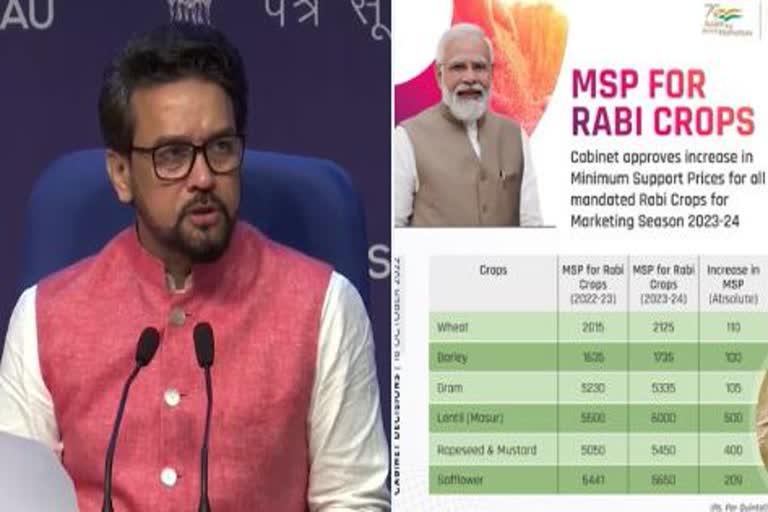New Delhi: In a major development that is likely to benefit farmers, the center has hiked the minimum support price (MSP) for six Rabi crops like wheat, gram, lentils rapeseed, and mustard, among others, from Rs 100 to Rs 500 per quintal for the marketing season of 2023-24. The decision taken by the Union Cabinet on Tuesday came a day after the Centre released the 12th installment of the Kisan Samman Nidhi in the accounts of farmers via direct benefit transfer.
Addressing the media personnel, Union Minister Anurag Singh Thakur said that the Modi government is working tremendously hard for the benefit of the farmers and drew a parallel between the pre and post-Modi Era. “The absolute highest increase in MSP has been approved for lentil (Masur) at ₹500/- per quintal (100 kg) followed by rapeseed and mustard at ₹400/- per quintal. For safflower, an increase of ₹209/- per quintal has been approved. For wheat, gram, and barley an increase of ₹110/- per quintal, and ₹100 per quintal respectively has been approved," the Cabinet Committee on Economic Affairs (CCEA) said in a press release.
Sowing of rabi (winter) crops begins in October, immediately after the harvest of Kharif (summer) crops. Wheat and mustard are major rabi crops. "The Government’s priority is on increasing production of oilseeds and pulses and thus fulfilling the objective of Atmanirbhar Bharat. The formulated strategies are to increase production through area expansion, productivity through High Yielding Varieties (HYVs), MSP support and procurement", CECA said in a statement.
Commenting on the decision, Prime Minister Narendra Modi on Tuesday said that the hike in the MSP will further energize the agriculture sector. While wheat prices have risen in comparison to the last two years, Food Secretary Sudhanshu Pandey on Monday said the increase in both wholesale and retail wheat prices is not "abnormal" and the government would intervene when required.
Also read: Farmers gather for 3-day MSP Guarantee Kisan Morcha session in Punjab Khod
In the statement, the government said the increase in MSP for rabi crops for the 2022-23 crop year is in line with the Union Budget 2018-19 announcement of fixing the MSP at a level of at least 1.5 times the all-India weighted average cost of production, aimed at reasonably fair remuneration for the farmers. Since 2014-15, there has been a renewed focus on increasing the production of oilseeds and pulses. The efforts have yielded good results. The productivity of pulses and oilseeds has increased substantially.
As a result, oilseeds production has increased from 27.51 million tonnes in 2014-15 to 37.70 million tonnes in 2021-22, as per the fourth advance estimates of the agriculture ministry. Pulses production has shown a similar increasing trend. The seed mini kits program is a major tool for introducing new varieties of seeds in the farmers' fields and is instrumental in increasing the seed replacement rate, it added.
The government's priority is on increasing the production of oilseeds and pulses to make the country self-reliant and reduce import dependency. The formulated strategies are to increase production through area expansion, productivity through high-yielding varieties, MSP support, and procurement. The government is also promoting the adoption of smart farming methods through the use of technology and innovation in the agriculture sector in the country.
Besides, the government is implementing a Digital Agriculture Mission (DAM), which includes India Digital Ecosystem of Agriculture (IDEA), Farmers Database, Unified Farmers Service Interface (UFSI), Funding to the States on the new Technology (NeGPA), Revamping Mahalanobis National Crop Forecast Centre (MNCFC), soil health, fertility and profile mapping.
Under the National e-Governance Plan in Agriculture (NeGPA), funding is given to state governments for digital agriculture projects using emerging technologies like Artificial Intelligence and Machine Learning (AI/ML), Internet of Things (IoT) and blockchain. The adoption of drone technologies is being done. To promote smart farming, the government is also promoting startups in the agriculture sector and nurturing agri-entrepreneurs. (With Agency Inputs)



